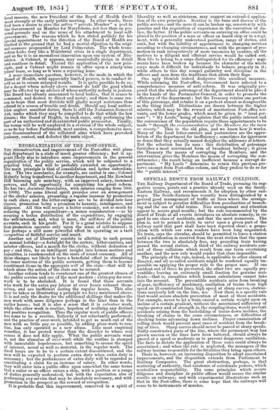• „ OFFICIAL RESCUE FROM RAILWAY COLLISION.
Tax Railway Department of the Board of Trade, pursuing its sug- gestive course, points out a practice already used on the South- Eastern Railway, and recommends it for adoption by other rail- ways. The South-Eastern has recently been distinguished by a general good management of traffic on lines where the arrange- ment is subject to peculiar difficulties from peculiarities of branch- ing and the use of tidal trains. Nice arrangement and attention appear to secure good results; but the rule recommended by the Board of Trade at all events introduces an absolute remedy, in re- gard to one class of accidents, and that the most numerous. The plan is, not to permit a train to enter upon a given part of the railway until that part shall have been reported clear; .a propo- sition with which our own readers have been long acquainted. No train, says the circular, should be permitted to leave a station until a notification is received from the next station that the space between the two is absolutely free, any preceding train having passed the second station. A third of the railway accidents con- sist of those collisions which result from one train overtaking another, and the new rule would render that class impossible.
The principle of the rule, indeed, is applicable to other classes of
disaster, and all so-called accidents might be rendered equally im- possible on applying the proper rule to the proper case. If one accident out of three be prevented, the other two are equally pre- ventible; leaving an extremely small fraction for genuine acci- dents—that is, casualties which human calculations cannot take into the account. The preventible accidents arise from breaking of gear, inefficiency of machinery, oscillation of trains from high speed on ill-constructed lines, high speed at sharp curves, obstruc- tions carelessly left on the line, 8:.e. Now there is a specific rule that would secure absolute prevention of most of those accidents. For example, never to let a train exceed a certain weight upon an incline of a certain gradient, without the ascertained sufficiency of engine-power and of strength in the coupling:irons, would prevent accidents arising from the baoksliding of trains down inclines, the breaking of chains in the same circumstances, or difficulties of checking trains advancing down inclines. Proper examination of rolling stock would prevent most cases of accident from the break- ing of tires. Sharp curves should never be passed at sharp speeds. Badly-constructed parts of the line, where the permanent way has grown uneven or the lines have been battered, should always be passed at a speed so moderate as to prevent dangerous oscillation. The facts to dictate the application of these rules could always be ascertained ; and when the rule is neglected, the managers of the railway become responsible for the fatalities they bring upon others.
There is, however, an increasing disposition to adopt ascertained improvements, and the disposition extends from Parliament to Railway Companies. The great obstruction, perhaps, is that scattering of authority, that existence of coordinate powers, which neutralizes responsibility. The same principles which secure diligence and discipline in public offices would secure the similar results on railways; and with experimental illustrations such as that in the Post-office, there is some hope that the railways will cease to be instruments of murder.


























 Previous page
Previous page